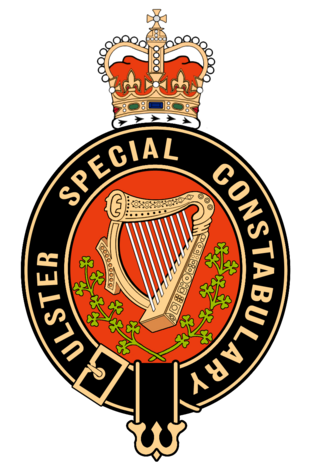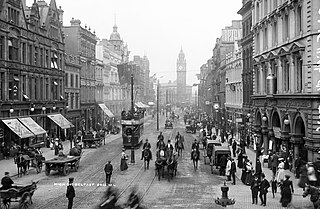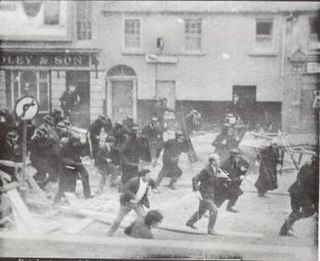Contents
- Incumbents
- Events
- Arts and literature
- Sport
- Football
- Births
- Full date unknown
- Deaths
- See also
- References
| |||||
| Centuries: | |||||
|---|---|---|---|---|---|
| Decades: | |||||
| See also: | |||||
Events during the year 1969 in Northern Ireland .
| |||||
| Centuries: | |||||
|---|---|---|---|---|---|
| Decades: | |||||
| See also: | |||||
Events during the year 1969 in Northern Ireland .

The Ulster Unionist Party (UUP) is a unionist political party in Northern Ireland. The party was founded as the Ulster Unionist Council in 1905, emerging from the Irish Unionist Alliance in Ulster. Under Edward Carson, it led unionist opposition to the Irish Home Rule movement. Following the partition of Ireland, it was the governing party of Northern Ireland between 1921 and 1972. It was supported by most unionist voters throughout the conflict known as the Troubles, during which time it was often referred to as the Official Unionist Party (OUP).

Terence Marne O'Neill, Baron O'Neill of the Maine, PC (NI), was the fourth Prime Minister of Northern Ireland and leader (1963–1969) of the Ulster Unionist Party (UUP). A moderate unionist who sought to reconcile sectarian divisions in Northern Ireland society and met with his counterpart in the Irish Republic, he was a member of the Parliament of Northern Ireland for the Bannside constituency from 1946 until his resignation in January 1970.
Arthur Brian Deane Faulkner, Baron Faulkner of Downpatrick,, was the sixth and last Prime Minister of Northern Ireland, from March 1971 until his resignation in March 1972. He was also the chief executive of the short-lived Northern Ireland Executive during the first half of 1974.

The Ulster Special Constabulary was a quasi-military reserve special constable police force in what would later become Northern Ireland. It was set up in October 1920, shortly before the partition of Ireland. The USC was an armed corps, organised partially on military lines and called out in times of emergency, such as war or insurgency. It performed this role most notably in the early 1920s during the Irish War of Independence and the 1956–1962 IRA Border Campaign.
Events in the year 1969 in Ireland.
Events from the year 1920 in Ireland.
Events from the year 1914 in Ireland.
The Bogside is a neighbourhood outside the city walls of Derry, Northern Ireland. The large gable-wall murals by the Bogside Artists, Free Derry Corner and the Gasyard Féile are popular tourist attractions. The Bogside is a majority Catholic/Irish republican area, and shares a border with the Protestant/Ulster loyalist enclave of the Fountain.

Free Derry was a self-declared autonomous Irish nationalist area of Derry, Northern Ireland that existed between 1969 and 1972 during the Troubles. It emerged during the Northern Ireland civil rights movement, which sought to end discrimination against the Irish Catholic/nationalist minority by the Protestant/unionist government. The civil rights movement highlighted the sectarianism and police brutality of the overwhelmingly Protestant police force, the Royal Ulster Constabulary (RUC).
The Ulster Constitution Defence Committee (UCDC) was established in Northern Ireland in April 1966 as the governing body of the loyalist Ulster Protestant Volunteers (UPV). It coordinated parades, counter-demonstrations, and paramilitary activities to maintain the status quo of the government, led a campaign against the reforms of Terence O'Neill and stymied the civil rights movement.

The Battle of the Bogside was a large three-day riot that took place from 12 to 14 August 1969 in Derry, Northern Ireland. Thousands of Catholic/Irish nationalist residents of the Bogside district, organised under the Derry Citizens' Defence Association, clashed with the Royal Ulster Constabulary (RUC) and loyalists. It sparked widespread violence elsewhere in Northern Ireland, led to the deployment of British troops, and is often seen as the beginning of the thirty-year conflict known as the Troubles.
The Northern Ireland Civil Rights Association (NICRA) (Irish: Cumann Cearta Sibhialta Thuaisceart Éireann) was an organisation that campaigned for civil rights in Northern Ireland during the late 1960s and early 1970s. Formed in Belfast on 9 April 1967, the civil rights campaign attempted to achieve reform by publicising, documenting, and lobbying for an end to discrimination against Catholics in areas such as elections (which were subject to gerrymandering and property requirements), discrimination in employment, in public housing and abuses of the Special Powers Act.
Ivan Averill Cooper was a nationalist politician from Northern Ireland. He was a member of the Parliament of Northern Ireland and a founding member of the Social Democratic and Labour Party (SDLP). He is best known for leading the civil rights march on 30 January 1972 that developed into the Bloody Sunday massacre.

Belfast is the capital of Northern Ireland, and throughout its modern history has been a major commercial and industrial centre. In the late 20th century manufacturing industries that had existed for several centuries declined, particularly shipbuilding. The city's history has occasionally seen conflict between different political factions who favour different political arrangements between Ireland and Great Britain. Since the Good Friday Agreement, the city has been relatively peaceful and major redevelopment has occurred, especially in the inner city and dock areas.

During 12–16 August 1969, there was an outbreak of political and sectarian violence throughout Northern Ireland, which is often seen as the beginning of the thirty-year conflict known as the Troubles. There had been sporadic violence throughout the year arising out of the Northern Ireland civil rights campaign, which demanded an end to discrimination against Catholics and Irish nationalists. Civil rights marches had been attacked by Protestant loyalists, and protesters often clashed with the Royal Ulster Constabulary (RUC), the overwhelmingly Protestant police force.
Events during the year 1968 in Northern Ireland.
The city of Derry, Northern Ireland, was severely affected by the Troubles. The conflict is widely considered to have begun in the city, with many regarding the Battle of the Bogside in 1969 as the beginning of the Troubles. The Bloody Sunday incident of 1972 occurred in Derry, in the Bogside area.
William Joseph Long OBE was a Unionist politician in Northern Ireland.
Burntollet Bridge was the setting for an attack on 4 January 1969 during the first stages of the Troubles of Northern Ireland. A People's Democracy march from Belfast to Derry was attacked by Ulster loyalists whilst passing through Burntollet.
The Northern Ireland civil rights movement dates to the early 1960s, when a number of initiatives emerged in Northern Ireland which challenged the inequality and discrimination against ethnic Irish Catholics that was perpetrated by the Ulster Protestant establishment. The Campaign for Social Justice (CSJ) was founded by Conn McCluskey and his wife, Patricia. Conn was a doctor, and Patricia was a social worker who had worked in Glasgow for a period, and who had a background in housing activism. Both were involved in the Homeless Citizens League, an organisation founded after Catholic women occupied disused social housing. The HCL evolved into the CSJ, focusing on lobbying, research and publicising discrimination. The campaign for Derry University was another mid-1960s campaign.